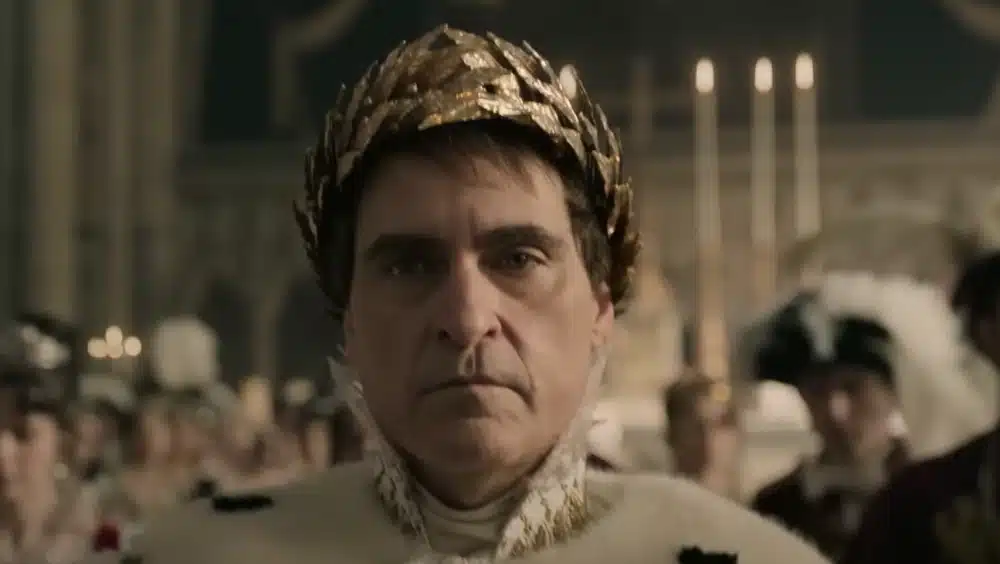




Dir: Ridley Scott | Cast: Joaquin Phoenix, Vanessa Kirby, Tahar Rahim, Rupert Everett, Paul Rees, Ben Miles, Ludivine Sagnier, Edouard Philipponnat | UK Drama 158′
Napoleon is a rather gloomy epic that mourns its French hero in misty landscapes, robust parliamentary debates, bloody battle scenes and sorrowful domestic settings where a doomed love story plays out amid gilded trophies and treasures.
Ridley Scott creates a sprawling two and a half hour feature that is more impressive than involving although Phoenix is compelling throughout as a flawed hero and likeable rogue, despite his American delivery: a soulful and mercurial figure whose private life never quite attains the glorious success of his strategic prowess as French military leader and emperor in various campaigns. Most notable is the Siege of Toulon, where he captures the port city from the English in the film’s opening stages, to his most significant triumph at the battle of Austerlitz with its atmospheric widescreen images of soldiers and horses plunging silently into the depths of a frozen lake where their blood mingles evocatively with the icy water. Scott lists Napoleon’s less admirable achievement in the film’s final title sequence that makes for grim reading with its tragic loss of life running into thousands; and this is probably one of the reasons why French critics have condemned the film.
Josephine, an imperious Vanessa Kirby, has managed to reinvent herself as Napoleon’s witty new wife. But despite her considerable talents as a patron of the arts and their torrid sex life and genuine love for each other, Napoleon choses to divorce her in favour of his country because, Josephine, six years older than him and in her second marriage, is unable to provide him with an heir. She is banished to the murky palace of Malmaison, Rueil, where she dies of diphtheria, Napoleon arriving too late to say a final farewell. The emperor, in turn, is deemed a threat to the security of Europe, and ends his days in the remote outpost of Saint Helena after a crushing defeat at the Battle of Waterloo in 1815, having previously returned from Elba.
Ambitious and informative, David Scarpa’s well-paced script straddles three decades, from the final stages of the French Revolution in 1793 until Napoleon’s death in May 1821. The guillotining of Marie Antoinette makes for a captivating opening sequence. We watch her being clamped onto the base of the guillotine before the blade is unleashed from its moorings slicing cleanly through her neck, the executioner dangling her bleeding head by the hair as the baying crowd roars.
Next comes Robespierre’s fate in parliament bringing an end to the Reign of Terror. This political instability offers Napoleon the ideal opportunity to surge up as a masterful strategist and architect of the Republic, crowning himself Emperor in 1804. At continuous loggerheads with England he tries to forge a pact with Prussia and Austria, which proves unsuccessful, and leads to heavy losses in Russia. Abdicating, he then heads for the Island of Elba, returning to France where he suffers a debilitating defeat against the Duke of Wellington’s army in alliance with Prussian Forces at Waterloo. And here Rupert Everett shines as a drole, rather foppish caricature of English aristocracy.
Stanley Kubrick would be proud of the film’s immaculate battle set pieces particularly at Waterloo, and there are some enjoyable support performances from Paul Rhys at Talleyrand, Edouard Philipponnat as Tsar Alexander, who is seen to enjoy a brief dalliance with Josephine, John Hollingworth as Marshal Ney and Richard McCabe as Lord Whitworth. But Napoleon belongs to its star Joaquin Phoenix who exudes strength and humanity despite his human flaws. @MeredithTaylor
NOW IN CINEMAS